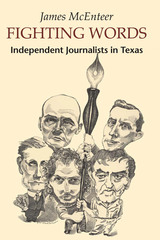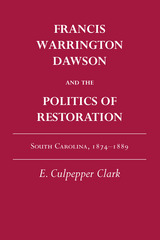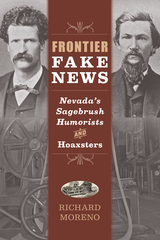6 start with F start with F


Fighting Words profiles five journalists who published the truth as they saw it, no matter how their reporting angered politicians, social and religious leaders, or other journalists.
The five journalists are William Brann (1855–1898), Don Biggers (1868–1957), John Granbery (1874–1953), Archer Fullingim (1902–1984), and Stoney Burns [Brent Stein] (1942–2011). Though they lived in different eras, all these men dealt with issues that society continues to face—racism, official corruption, religious freedom, educational reform, political extremism of the left and right, the clash of urban and rural values, and the fear of change. Their lives and work constitute a unique, alternative perspective on Texas history and the history of journalism itself.
In addition to the troubling questions they raised on social issues, these independent journalists challenge us, as they challenged the mainline media of their own times, to define the function of journalism and to examine the mandate of the First Amendment. We may doubt the wisdom of some of their convictions, but not the courage they needed to express them in the face of ridicule, hostility, intimidation, and even death. More than the specific causes they fought for, the independents’ passion for truth and their absolute belief in free speech constitute their greatest legacy to us and to journalism.

"This is a book that anyone interested in South Carolina history, the emergence of the New South, and the southern press, so important to the regional culture, will find valuable. Clark has researched all the important manuscript collections and a wide variety of other sources. He also writes in a style that is lucid and imaginative." —Journal of Southern History

Freda Kirchwey—writer, editor, publisher, opinionmaker, feminist, wife, and mother—was a salient figure in twentieth-century America, a beacon for liberals and activists of her era. A journalist with The Nation from 1918 to 1955—owner, editor, and publisher after 1937—she was an advocate of advanced ideas about sexual freedom and birth control and a tireless foe of fascism. The quintessential new woman, she combined a private and highly visible public life.
In this first full-scale biography of Kirchwey, Sara Alpern weaves the strands of gender-related issues with larger social explorations. An early feminist, from a privileged and progressive background, Kirchwey was determined to enjoy both career and marriage, but the early deaths of two of her three sons and strained relations with her husband led to self-doubt about her identity. Yet despite any hidden misgivings, her humanitarianism and outstanding journalistic and critical gifts projected her onto the larger stage of public life. Alpern richly describes Kirchwey’s extraordinary work editing The Nation, one of the longest surviving American liberal journals, and shaping public opinion on domestic and international affairs. Kirchwey focused on large political and international issues—the Spanish Civil War, democracy versus fascism and Nazism, pacifism and collective security, the plight of refugees and Zionism, McCarthyism and censorship, and, finally, the peaceful employment of atomic power.
Freda Kirchwey’s life story introduces a remarkable woman to a new generation struggling with personal and career goals as it recalls the efflorescence of liberalism for an older generation of readers.


When readers see the names Mark Twain and Dan De Quille, fake news may not be the first thing that comes to mind. But these legendary journalists were some of the original, and most prolific, fake news writers in the early years of Nevada’s history. Frontier Fake News puts a spotlight on the hoaxes, feuds, pranks, outright lies, witty writing, and other literary devices utilized by a number of the Silver State’s frontier newsmen from the mid-nineteenth through the early twentieth centuries. Often known collectively as the Sagebrush School, these journalists were opinionated, talented, and individualistic.
While Mark Twain (Samuel Clemens), who got his start at Virginia City’s Territorial Enterprise, and Dan De Quille (William Wright), who some felt was a better writer than Twain, are the most well-known members of the Sagebrush School, author Richard Moreno includes others such as Fred Hart, who concocted a fake social club and reported on its gatherings for Austin’s Reese River Reveille, and William Forbes, who enjoyed sprinkling clever puns with political undertones in his newspaper articles.
Moreno traces the beginnings of genuine fake news from founding father Benjamin Franklin’s “Supplement to the Boston Independent Chronicle, Number 705, March 1782,” a fake newspaper aimed at swaying British public opinion, to the fake news articles of New York and Baltimore papers in the early 1800s. But these examples are only a prelude to the amazing accounts of petrified men, freeze-inducing solar armor, magically magnetic rocks, blood-curdling massacres, and other nonsense stories that appeared in Nevada’s frontier newspapers and beyond.
READERS
Browse our collection.
PUBLISHERS
See BiblioVault's publisher services.
STUDENT SERVICES
Files for college accessibility offices.
UChicago Accessibility Resources
home | accessibility | search | about | contact us
BiblioVault ® 2001 - 2024
The University of Chicago Press









